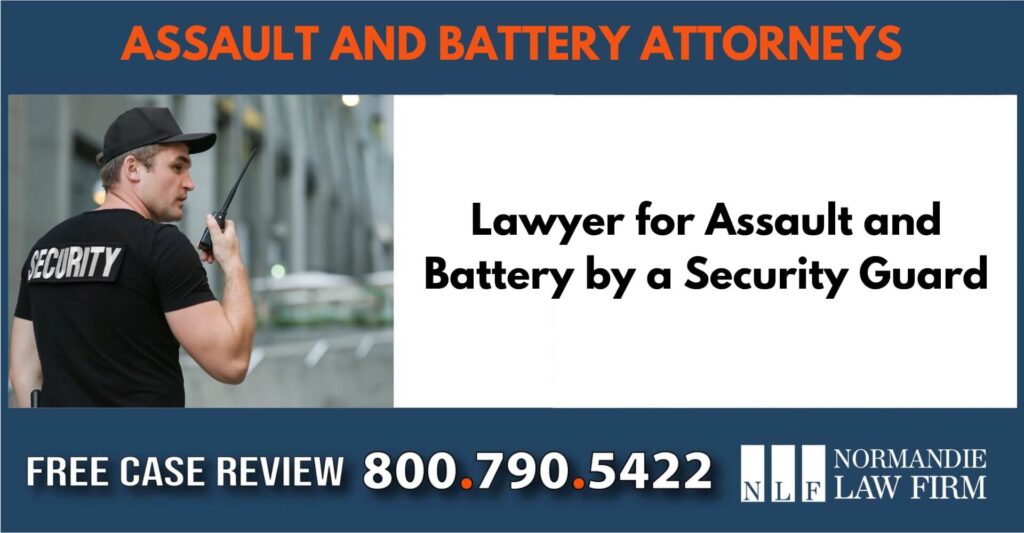Assault and battery incidents come with harsh consequences under California law, but there are exceptions that merit the use of physical violence. For example, what are the laws regarding physical assault by a security guard? Can you take legal action for unnecessary or excessive force by someone working for security?
Achieving a just outcome is very challenging when you are suing for assault and battery by a security guard. That’s why we urge you to contact our law firm and receive guidance from a lawyer that specializes in excessive violence by security guard lawsuits. With decades of experience in assault and battery claims, we are more than ready to go after the parties at fault and ensure that you are justly compensated.
Our law firm is here 24/7 to help with all your questions and concerns. Reach out to us at your earliest convenience to receive a free consultation if you or your loved one was injured unnecessarily by a security guard.
Legal Definition of Assault and Battery
Security guards work in various settings, like bars and nightclubs, concert venues, stores, and private parties. You also find security personnel at courthouses and other government buildings, and these workers are crucial to protecting the public in dangerous situations.
As a legal charge, assault is any act that causes someone to be in imminent fear of their life. If the other party’s conduct escalates to violence, the offense is elevated to “battery.” So, even though we commonly use the term assault and battery, you can have assault without the actual act of physical violence. Incidents of physical harm inflicted on others can form the basis of a criminal prosecution or civil lawsuit. Victims can seek justice in both or either the criminal or civil courts, and the right legal strategy depends on many details that are specific to your case.

Our Recent Verdicts and Settlements
$1.9 Million
$600,000
$1.5 Million
$54 Million
$525,000
$1.2 Million
Security Guards Using Force when Necessary
We all have a basis sense of what a security guard is supposed to do, and this can include varying degrees of violence against others. However, California laws place significant limitations on when a security guard can physically place their hands on others.
Those working security can use physical force to prevent harm to others or themselves, or if there is a threat to the property they are guarding. They can also detain suspects in criminal cases, but they cannot just restrain someone on mere suspicion. Furthermore, the degree of violence must be proportionate to the threat posed by the other party. Security guards must also use violence as a last resort, meaning they must try to use other measures to deescalate a situation before they resort to assault and battery. At the end of the day, excessive violence by security is illegal, and assault victims have the right to sue the responsible parties for monetary compensation.
Security Guard Assault and Battery Injuries
If you are attacked by a security guard that used force in a situation where it was unwarranted, you may end up with severe injuries and complications. Bodily harm from being assaulted by a security guard includes:
- Broken bones
- Cuts, abrasions, and bruises
- Joint dislocation
- Traumatic brain injury
- Neck or spinal cord damage
- Rupturing of internal organs
- Facial disfigurement
- Lost or broken teeth
- Hearing or vision loss from head trauma
- Tearing of underlying tissue, like tendons and ligaments
- Paralysis in one or more parts of the body
- Chronic pain from complex regional pain syndrome
Victims of a violent assault often have PTSD and other psychological disorders. Many of these people develop phobias, insomnia, panic attacks, and other mental health issues that reduce their quality of life. Counseling from a licensed therapist can help victims move forward in a positive direction, but therapy and other medical treatments are expensive. This is why it’s important to seek restitution from an assault and battery lawsuit in a timely manner.
Who is Liable for my Injuries from a Physical Assault?
Poor judgement, lack of training, malicious intent, and other dangerous behaviors by a security guard can cause devastating injuries to patrons, guests, and visitors. Victims who are assaulted can sue one or more of the following parties:
- The security guard – you can sue the perpetrator of the abuse for using physical force when it was not necessary, or using too much force given the circumstances. For example, a security guard can severely injure or kill someone by using a chokehold or gun when less violent measures would have sufficed.
- Security firm – under the principle of vicarious liability, employers may be liable for certain actions by their employees when they cause bodily harm to others. The security company may have neglected to properly train the individual, run through background checks, or chose to hire someone with a prior history of violence. In many cases, you find that these companies failed to fire a security guard in spite of multiple complaints about their behavior.
- Property or business owner – the property owner or whoever is in charge of the facility if they are responsible for hiring / screening / training the security guard.
- Third parties – there may have been third parties that were present at the time that failed to call the police or intervene in some other way to prevent the assault.
For some claimants, there is liability by more than one party, and this can increase the amount of compensation from a security guard assault and battery claim. A lawyer with experience in security guard misconduct can investigate what happened to you and file a damages claim against everyone that caused or contributed to your injuries.
Restitution for Assault and Battery Victims
If you were assaulted by a security guard at a mall, nightclub, college campus, or any other location, you may be entitled to payments in the form of:
- Medical costs – compensation for immediate and on-going medical expenses
- Lost income – loss of salary and job benefits or business income due to your medical needs
- Pain and suffering – to make up for the physical and mental anguish resulting from an accident, like emotional distress and diminished quality of life.
- Property damage – for any loss of value or destruction of personal belongings
- Punitive damages – issued by juries in cases where the defendant’s acted with blatant disregard for the victim’s safety
Our team of security guard assault lawyers can talk to you about your rights and help you navigate the legal system to a successful conclusion.
What to Do after a Security Guard Assault
Taking the right steps after an assault is the key to having the right evidence and foundation for a lawsuit. Please consider these recommendations by our attorney if you are injured by a security guard using excessive force:
- Seek medical attention– don’t put off medical treatment, as you will need hospital bills, prescriptions, doctor’s notes and other records that clearly establish the harm you suffered.
- File a police report – make sure to contact the police and file a report, which is another form of evidence to show that you were injured by a security guard assaulting you. The officer that takes down your information will give you instructions on how to obtain an official copy of the report.
- Consult a security guard assault and battery attorney – a lawyer can help you with every aspect of your case, from locating evidence to finding experts to support your claims. You should also have an attorney to handle negotiations with the insurance company, and if necessary, petition the court for a lawsuit.
How Much Time Do I have to Sue for Assault and Battery?
Most assault by security guard lawsuits have a deadline of 2 years, which normally begins on the date of the incident. But there are exceptions that can allow for an extension, which you can learn about from a member of our legal team.
Please note that some cases have a shorter statute of limitations, meaning you have less than 2 years to file a claim. This is an important concern if the person that harmed you works for a government agency or public school district. Under California law, claims for liability by a government employee or entity have a 6-month statute of limitations. If you do not submit a claim to the appropriate agency within 6 months, your right to sue will be permanently invalidated.
Contact Normandie Law Firm
Our assault and battery legal experts are here to speak with you 24 hours a day, 7 days a week, so don’t hesitate to reach out if a security guard assaulted you or a family member. We are more than ready to provide compassionate and reliable advice and help you develop the right plan of action.
If you qualify for damages from an assault and battery case, you do not have to worry about paying for legal services. Normandie Law Firm operates on contingency, meaning that we do not charge upfront to provide you with legal representation. In order to get paid, we need to resolve the case in your favor. If we fail to obtain your settlement, you pay nothing under the Zero Fee Guarantee. If you are ready for a detailed discussion on your rights and legal options, please take a moment to schedule a free case review.
Other Pages on Our Website Related to This Topic
Broken Vertebrae after an Accident – Spinal Cord Injury Lawyer
How Long Does It Take to Settle a Broken Wrist Injury Case
Average Worker’s Comp Claim Value For Workplace Shock Injury











